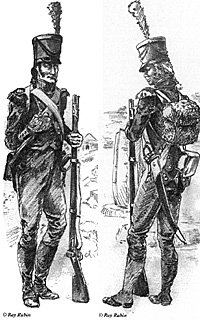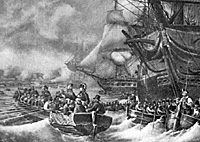The Expedition Commences
 The Directory formally sent Bonaparte off with instructions to capture Malta and Egypt, break British power in the East, build a canal through the Isthmus of Suez, maintain stable relations with the Ottoman Empire, and improve the conditions of the Egyptian population! The Directory estimated that securing Egypt would take six months.
The Directory formally sent Bonaparte off with instructions to capture Malta and Egypt, break British power in the East, build a canal through the Isthmus of Suez, maintain stable relations with the Ottoman Empire, and improve the conditions of the Egyptian population! The Directory estimated that securing Egypt would take six months.
Four of the fourteen French demi-brigades (DB) that reached Egypt were light (legere) infantry. Organized and equipped the same as line infantry, a light demi-brigade was
supposedly more adept at skirmishing and loose order combat, and asserted the right to lead all attacks. Each light battalion was organized with one elite company, called carabinier (figure on right), and eight "standard" companies, called chasseur (figure on left). Uniforms for light troops were all blue, including the pants..
Furthermore, Napoleon's invasion would be coupled with a diplomatic initiative. Talleyrand intended to go to Constantinople to
explain that the French wanted to "protect" Ottoman control of Egypt (a trip he never made, sending a delegate instead).
With remarkable speed and secrecy, Bonaparte assembled an invasion force that consisted of about 35,000 troops, almost 13,000 crewmen serving on the ships, and 167 civilian scientists and scholars. When the French embarked for Egypt, they had approximately four million freshly
extorted Swiss francs, which was a relatively small amount vis a vis the expense of the project.
Bonaparte appointed 32-year-old General Elzear Dommartin to command the artillery, and 36-year-old Alexandre Dumas (father of the man who would write The Three Musketeers) to command the cavalry. For his chief of staff, Bonaparte selected 45-year-old Alexandre Berthier, who had served well in that capacity during the 1796-97 Italian campaign and would
continue in the role until Napoleon's first abdication in 1814. The Army of the Orient, as it was known, also had at its disposal four hundred transports, with an escort of thirteen ships of the line and seven frigates, all vessels under the command of 45-year-old Vice-Admiral
Paul Brueys.
The main convoy left from
the port of Toulon....
Equipment included 75 siege guns and mortars, 96 field guns and 1,230 horses. Such an enormous operation required several ports of embarkation. Toulon was the main port, and other contingents were to leave from nearby Marseille, Genoa (Italy), Ajaccio (Corsica), and Civita Vecchia (near Rome).
Bonaparte prepared for the campaign in ten weeks. The destination remained unknown but to a very few men. To confuse British spies, plans continued for the invasion of England and the forces assembling in the south of France bore the name the Left Wing of the Army of England. The Directory even leaked false information that Napoleon was to report to Brest to assume command of the invasion forces, and the Toulon fleet was to sail for Brest as well.
The Expedition Departs
The main convoy left from the port of Toulon, sight of then Captain Bonaparte's first military success in 1793, and was followed by others from Ajaccio and Genoa. Napoleon's flagship, the Orient, was so heavily laden that it scraped against bottom as it departed the harbor. General Desaix's division would set sail from Civita Vecchia and attempt to rendezvous with the rest of the armada. Toulon proved to be lucky for Napoleon once again; a storm two days prior had blown the blockading British ships off station, providing the expedition with a clear escape and favorable head start.
Napoleon's first objective, Malta, boasted a highly fortified and vast harbor that could be invaluable in any future struggles in the eastern Mediterranean. On 9 June, after an uncomfortable journey for the frequently sea-sick Bonaparte and many of his men, the main fleet arrived at Malta to find that Desaix's task force had beaten them there by two days. Desaix's ships had been refused access to fresh water in the main harbor by an emissary from the Knights of Saint John of Jerusalem. This provided an excuse for the upcoming fait accompli.
The Knights, a military and religious order which dated back to the Crusades, had held the island since 1530. Despite the longevity of their rule, the landings at Malta were virtually
unopposed. Desaix's aide-de-camp (ADC) Savary wrote: "All those splendid fortifications, that indicated the power of the Order and the strength of the place, became useless. We pushed our advances, on this day, to the very foot of the ramparts on the land side. We were amazed at the weakness of the defense, and at a loss to
account for the circumstance of a place, which appeared perfectly unassailable, presenting so easy a conquest to our arms..."
Apparently, Napoleon had already been involved in some clandestine bargaining, remembering the old adage that it is easier to take a fortress from the inside. The Knights had become an anachronism by the end of the 18th Century, despite being under the protection of Tsar Paul I (which gave Russia a nominal foothold in the Mediterranean; the loss of Malta was one of the main reasons that Russia would join a second coalition against France in 1799).
 Napoleon occupied Malta on 10-12 June, 1798 without much resistance. The rest of the expedition proved much more difficult.
Napoleon occupied Malta on 10-12 June, 1798 without much resistance. The rest of the expedition proved much more difficult.
... Bonaparte swept away the vestiges
of feudalism and hurtled the populace
of Malta into the world of Republican France.
Most of the three hundred or so Knights were French; many others were too infirm or apathetic to defend their decrepit Order. Furthermore, the Knights had not endeared themselves to the Maltese population, largely by refusing to allow any natives to join the Order and by denying them access to education despite a considerable amount of taxation.
Thus the local militia, although called out, showed little inclination to shed their blood to preserve a government they fully resented and little shared. All of these factors were unknown to Savary and others. They marveled at their good fortune before they understood the cause of it. Napoleon would later say that "I took Malta when I was in Mantua [Italy]." It was not an idle boast.
With swift and admirable energy, Bonaparte swept away the vestiges of feudalism and hurtled the populace of Malta into the world of Republican France. Historian Stephen Ross described this truly laudable flurry of reforms:
"He chose a nine-man commission to govern the islands, reorganized the courts on the French model, ... and turned the holdings of the Knights into national lands. He abolished slavery and all remnants of feudalism and annexed Malta to the Republic. He also issued orders to establish a school system, a taxation system, and a militia. Finally he placed General Vaubois in charge of the French garrison, a force consisting of some three thousand infantry and four hundred gunners ......"
On 19 June, after confiscating several million francs worth of treasure, the French departed the safe harbor of Malta and sailed for Alexandria, narrowly missing interception by British Rear Admiral Nelson's pursuing ships on the night of 22/23 June. The eleven day voyage provided Napoleon with time that he spent in discussion with some of his officers and civilian experts (the "savants") who accompanied the expedition.
Napoleon's secretary Bourienne gives an account of the general's activities:
A total lack of experience
in amphibious operations
did little to facilitate
the chaotic process.
"Whilst we were at sea, he seldom rose before ten o'clock in the morning. The Orient [flagship of the expedition] had the appearance of a populous town, from which women had been excluded; and this floating city was inhabited by 2,000 individuals, amongst whom were a great number of distinguished men. Bonaparte every day invited several persons to dine with him..."
"One of Bonaparte's greatest pleasures during the voyage was, after dinner, to fix upon three of four persons to support a proposition and as many to oppose it. He had an object in view by this. These discussions afforded him an opportunity of studying the minds of those whom he had an interest in knowing well, in order that he might afterwards confide to each the functions for which he possessed the greatest aptitude.
It will not appear singular to those who have been intimate with Bonaparte, that in these intellectual contests he gave the preference to those who supported an absurd proposition with ability over those who had maintained the cause of reason.
One day he asked whether the planets were inhabited, on another what was the age of the world; at another time, the truth or fallacy of presentiments [foreseeing the future], and the interpretation of dreams."
Not everyone found Napoleon's on board "institute" a stimulating experience. When awoken during the proceedings from his loud snoring slumber, Bonaparte's ADC Junot snapped that "his rotten damned Institute would send anyone to sleep."
More Napoleon in Egypt
-
Napoleon in Egypt: Introduction
Napoleon in Egypt: Why Egypt?
Napoleon in Egypt: Alliance and Assembly
Napoleon in Egypt: Expedition Commences
Napoleon in Egypt: Expedition Arrives
Napoleon in Egypt: Battle of the Pyramids
Napoleon in Egypt: French Artillery Strength
Napoleon in Egypt: French Dragoons Uniform Guide
Napoleon in Egypt: French Light Cavalry Uniform Guide
Napoleon in Egypt: French Army of Orient Order of Battle (text: fast 10K)
Napoleon in Egypt: French Army of Orient Order of Battle (graphics: very slow: 314K)
Cover Illustration: Napoleon in Egypt
Back to Table of Contents -- Napoleon #13
Back to Napoleon List of Issues
Back to MagWeb Master Magazine List
© Copyright 1998 by Napoleon LLC.
This article appears in MagWeb (Magazine Web) on the Internet World Wide Web.
The full text and graphics from other military history magazines and gaming magazines are available at http://www.magweb.com
Order Napoleon magazine direct